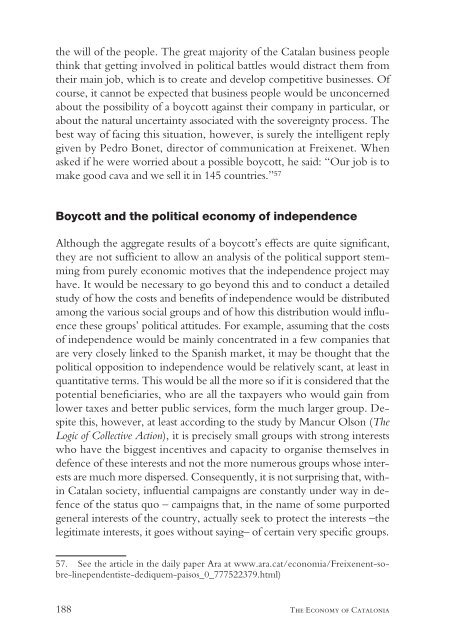The Economy of Catalonia
the_economy_of_catalonia._questions_and_answers_on_the_economic_impact_of_independence
the_economy_of_catalonia._questions_and_answers_on_the_economic_impact_of_independence
Create successful ePaper yourself
Turn your PDF publications into a flip-book with our unique Google optimized e-Paper software.
the will <strong>of</strong> the people. <strong>The</strong> great majority <strong>of</strong> the Catalan business people<br />
think that getting involved in political battles would distract them from<br />
their main job, which is to create and develop competitive businesses. Of<br />
course, it cannot be expected that business people would be unconcerned<br />
about the possibility <strong>of</strong> a boycott against their company in particular, or<br />
about the natural uncertainty associated with the sovereignty process. <strong>The</strong><br />
best way <strong>of</strong> facing this situation, however, is surely the intelligent reply<br />
given by Pedro Bonet, director <strong>of</strong> communication at Freixenet. When<br />
asked if he were worried about a possible boycott, he said: “Our job is to<br />
make good cava and we sell it in 145 countries.” 57<br />
Boycott and the political economy <strong>of</strong> independence<br />
Although the aggregate results <strong>of</strong> a boycott’s effects are quite significant,<br />
they are not sufficient to allow an analysis <strong>of</strong> the political support stemming<br />
from purely economic motives that the independence project may<br />
have. It would be necessary to go beyond this and to conduct a detailed<br />
study <strong>of</strong> how the costs and benefits <strong>of</strong> independence would be distributed<br />
among the various social groups and <strong>of</strong> how this distribution would influence<br />
these groups’ political attitudes. For example, assuming that the costs<br />
<strong>of</strong> independence would be mainly concentrated in a few companies that<br />
are very closely linked to the Spanish market, it may be thought that the<br />
political opposition to independence would be relatively scant, at least in<br />
quantitative terms. This would be all the more so if it is considered that the<br />
potential beneficiaries, who are all the taxpayers who would gain from<br />
lower taxes and better public services, form the much larger group. Despite<br />
this, however, at least according to the study by Mancur Olson (<strong>The</strong><br />
Logic <strong>of</strong> Collective Action), it is precisely small groups with strong interests<br />
who have the biggest incentives and capacity to organise themselves in<br />
defence <strong>of</strong> these interests and not the more numerous groups whose interests<br />
are much more dispersed. Consequently, it is not surprising that, within<br />
Catalan society, influential campaigns are constantly under way in defence<br />
<strong>of</strong> the status quo – campaigns that, in the name <strong>of</strong> some purported<br />
general interests <strong>of</strong> the country, actually seek to protect the interests –the<br />
legitimate interests, it goes without saying– <strong>of</strong> certain very specific groups.<br />
57. See the article in the daily paper Ara at www.ara.cat/economia/Freixenent-sobre-linependentiste-dediquem-paisos_0_777522379.html)<br />
188 <strong>The</strong> <strong>Economy</strong> <strong>of</strong> <strong>Catalonia</strong>


